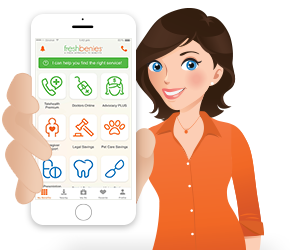IS TELEHEALTH DANGEROUS?
Has this ever happened to you? You don’t feel well, you’re 99% sure what the issue is (because you’ve had it before), you spend time booking a doctor appointment, you spend time driving there, you spend time sitting in the waiting room, you spend time sitting in the exam room – all to get your 4 minutes with the doctor who gives the advice or Rx you expected. To top it all off, you spend time waiting to pay your $150 visit fee.
Enter telehealth or telemedicine. This is a service where a physician talks with a patient via phone or video to treat simple issues like flu, sinus infection, pink eye, etc. – it’s been estimated that 70% of medical issues can be handled this way. And, if the doctor deems it appropriate, they can call in a prescription. If you’re not familiar, click here to read an article about how telehealth works and here for the tactical steps of a telehealth visit.
It’s important to note that there are many conditions telehealth can’t treat. In short, it isn’t there to handle complicated medical issues, true emergencies or chronic conditions and it doesn’t replace the relationship you have with your doctor (click here to learn more).
Some say telehealth is dangerous and others disagree. Here’s a recap of some of the players and my thoughts to help you form yours…
What do some states say?
At this time, a contingent of the Texas, Idaho and Arkansas Medical Boards, as well as the Arkansas legislature say this type of visit shouldn’t be allowed unless a physician has previously seen the patient in person to establish a doctor-patient relationship.
Their concern is patient safety, which is usually backed up with a general statement that “things could go wrong.” To date, I haven’t seen any published evidence from the detractors about the dangers of telehealth. They also haven’t identified criteria that could make it a safe scenario (see notes below outlining the American Medical Association’s criteria).
As of this writing, the Idaho House and Senate just passed a law that allows for telehealth when provided based on some standard guidelines. That leaves just Arkansas as a “NO” and Texas in heavy discussions for the future.
What do other states say?
Currently, 48 states allow telehealth as I described above. Everyday, I read articles about states expanding the use of and payment for telehealth services to increase access to care for their citizens.
What do some telehealth companies say?
Teladoc, the nation’s leading telehealth provider, says their physicians have performed 140,000 telehealth visits over 10 years in Texas without a single malpractice claim (not that they’ve never been found guilty - there has literally never been a claim). In just 2014, they performed 298,000 consultations throughout the US and have some of the largest employers among their clients. Along the way, they have 95% member satisfaction, and 97% physician satisfaction.
What does the American Medical Association (AMA) say?
The American Medical Association (AMA) believes telehealth visits are valid when done correctly and have set some standards. A patient-physician relationship must be established which can be done via a phone and/or video visit, as long as certain criteria are met, including:
**The patient’s medical history should be collected.
**The provider must follow evidence-based clinical guidelines.
**The visit will be documented, including any prescriptions written.
**Notes from the visit should be made available to the member, with the ability to forward to the member’s family physician.
**Telehealth providers should coordinate their care with the family physician - not try to replace the family physician.
What do patients say?
It just so happens I’ve seen my share of impassioned letters to the Texas Medical Board from Texas citizens who’ve used telehealth and are about to lose their access to it. They say telehealth helps them save because their current health insurance plan has debilitating out-of-pocket costs. They tell stories about how they saved thousands and get peace of mind because they were able to call a doctor to get advice versus having to rush to an expensive ER. They tell stories of being able to keep kids at home to heal instead of having to bundle up the family for an outing to the doctor. They say they’re able to avoid the potential of getting sicker in a doctor’s waiting room. Working moms and dads tell stories of not having to take time off for their own care or their children’s care when simple medical issues arise. Employers tell stories of how they love providing this option as a benefit to their employees – how it helps their employees save on healthcare costs and keeps them at work.
What do I say?
Hey, I’m writing the article, so I get an opinion! :) I agree with the AMA: done right, telehealth increases access to care for simpler issues in a safe way. It’s a simple and inexpensive addition to a primary care relationship.
I can’t answer for why some doctors think telehealth is unsafe - in the absence of evidence to support the position, I’m left wondering if this contingent of physicians doesn’t like the idea of competition from other doctors. While I can say I understand their concern, I can’t condone their argument. They provide no appropriate alternative to getting their patients better access to care. There are many reasons why telehealth is growing throughout our country. In short, a major doctor shortage, skyrocketing medical costs, insurance plans with increasing out-of-pocket costs, and you know why else? People love it and share the idea with their friends and family.
Let's not forget that a few short years ago, advising and prescribing via telephone was common practice in a doctor's office. And you weren't talking to YOUR doctor, you were talking to the on-call physician you had never seen before.
At a time of skyrocketing out-of-pocket costs, we need MORE ways to access care for simple healthcare issues, not less. When most states and the federal government are expanding the appropriate use of telehealth to reduce unnecessary ER, urgent care center, or doctor office visits, now is not the time doctors (or legislators) should be limiting it.
Now it’s your turn! Have you used a telehealth service? How did your visit go? Are you concerned about the safety of this service? Do you have questions? Leave a comment below or email me at reid@freshbenies.com.
Calling all Texans! Now is the time to email the Texas Medical Board with your disapproval. On April 4th, they plan to severely restrict telehealth. Click here to learn more and send your thoughts to Rules.Development@tmb.state.tx.us.
















